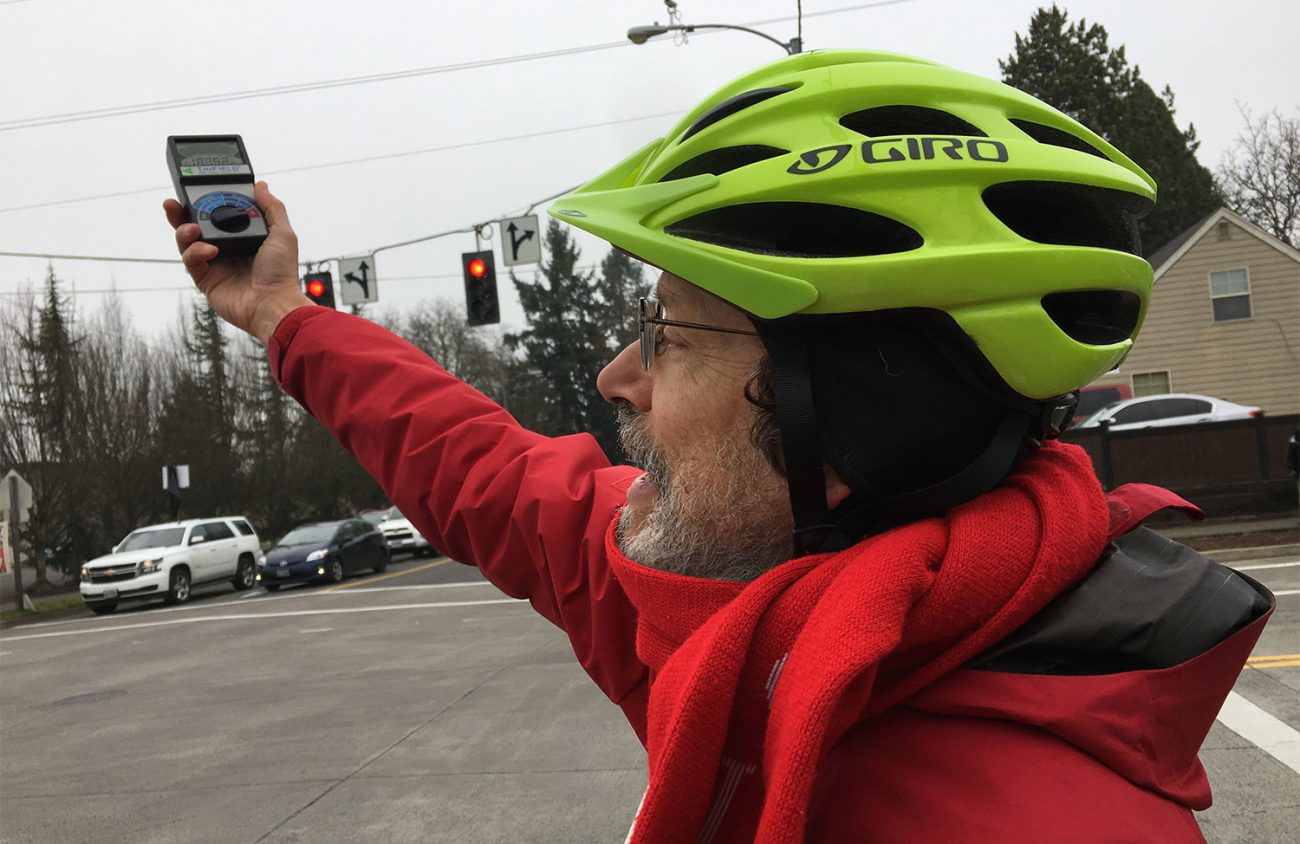About 10 people were at the intersection of 24th Avenue and Hilyard Street on Saturday, Jan. 26. Holding up signs calling for an end to 5G technology and handing out flyers to people stopped at red lights, members of Families for Safe Meters braved a cold foggy afternoon to protest the arrival of 5G technology in Eugene.
“If you look at that box, you’ll see a radiation EMF warning sign,” Victor Odlivak, who ran for an EWEB commissioner position in 2016 on a platform of opposing smart meters, told Eugene Weekly at the rally. He pointed toward the 5G antenna that is attached to an EWEB pole at the intersection. “That’s the law: They have to put it on the box, so they know it’s dangerous.”
Odlivak, holding an EMF meter that can read electromagnetic waves, says though the 5G antenna hasn’t been turned on yet, it is still emitting from four to 14 milliwatts.
Odlivak makes the point that radiation surpassing five milliwatts from 5G antennas isn’t healthy. Regardless of Odlivak’s concern, the next generation of cell wireless technology is coming to Eugene thanks to a Federal Communications Commission effort to streamline the deployment of the wireless infrastructure.
Opponents of 5G and public officials disapprove of how it was rolled out, saying the deployment erodes local democracy.
Smart meters use digital technology to wirelessly send and receive information from a home to a utility. 5G technology is a next-generation wireless service that can support faster internet speed and technologies necessary for car-connected technologies — such as self-driving cars.
The FCC issued an order in September 2018 to accelerate the deployment of 5G antennas, as well as to limit the amount a municipal government can charge to telecommunication companies. The spirit of the order was to ensure that the U.S. “wins the global race to 5G to the benefit of all Americans,” according to the FCC document.
Moreover, the FCC deregulation intends to eliminate nearly $2 billion in municipal costs to deploy the 5G antennas.
As a result, the city of Eugene could face a loss in its general fund from $2 million to $4.2 million annually, the city of Eugene’s Finance Director Twylla Miller said in a budget committee meeting in March 2018.
The city of Eugene joined a group of cities in filing a petition for review to challenge the FCC order in December 2018, says Caitlin Estes, the city’s communications coordinator. Titled City of Eugene, City of Huntsville and City of Bowie v. FCC and USA, it’s been transferred to the U.S. Court of Appeals for the Ninth Circuit as of Jan. 10.
The city is sharing the legal costs of challenging the FCC with other cities, but as of now has no idea how much the exact cost is for Eugene.
By joining the petition, the city’s intent is to stop the FCC ruling that currently affects all cities’ ability to manage their right-of-way, Estes says. The city’s legal action seeks to preserve the Eugene City Council’s adopted 1997 Telecommunications Ordinances, which support the city’s authority and responsibility to manage the public right-of-way, especially in issuing permits for wireless facilities, Estes adds.
On Jan. 31, Friends of Amazon Creek, a neighborhood group that oppose 5G antennas, sent a group of people — three with Ph.D.s — to meet with Mayor Lucy Vinis to encourage immediate action in curtailing the use of the 5G antennas.
Eben Fodor, a community-planning consultant with Fodor and Associates, raised questions at the meeting for Vinis about the deployment of 5G antennas. He says the increased power consumption of additional antennas will undermine the city’s climate action plan.
He adds that 5G antennas, which can be installed anywhere without public notice, will most likely be placed every 300 feet — so 5G could be on about every block throughout the city.
Although Fodor says the FCC currently prevents cities from prohibiting 5G and other cell services, the city could limit where the antennas could be deployed. If the petition leads to an overruling of the FCC order, this would change.
He says the group suggested that Vinis issue a moratorium until a public hearing can be held, since there is a lack of public awareness about the deployment of the 5G antennas.
During the meeting, Vinis said she thought EWEB issued the permits for 5G antennas.
But Joe Harwood, EWEB spokesperson, says the city issues permits for the city’s right-of-way. While local governments can regulate the location, design and deployment of wireless facilities, he says, it can’t discriminate or create barriers for small-cell deployment — such as 5G antennas.
EWEB is concerned about the power grab conducted by the FCC and federal government, Harwood says, referencing the September 2018 ruling to accelerate 5G. But he says the agency can’t do much when it comes to preempting federal law.
The FCC is also facing opposition on the push for rapid 5G deployments from the U.S. Conference of Mayors, National League of Cities and the League of Oregon Cities.
The city of Eugene maintains a webpage at eugene-or.gov with updated locations of permitted and pending permits for right-of-way installments.
